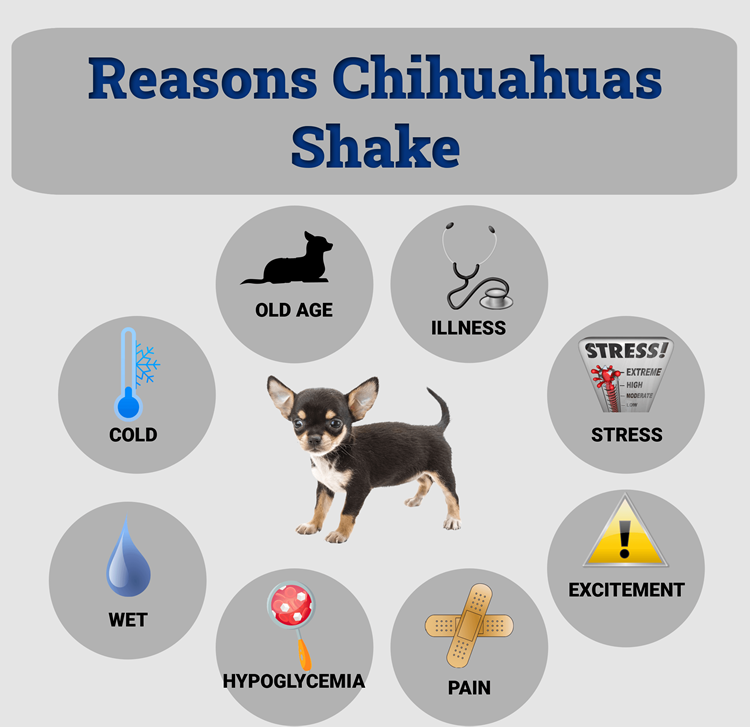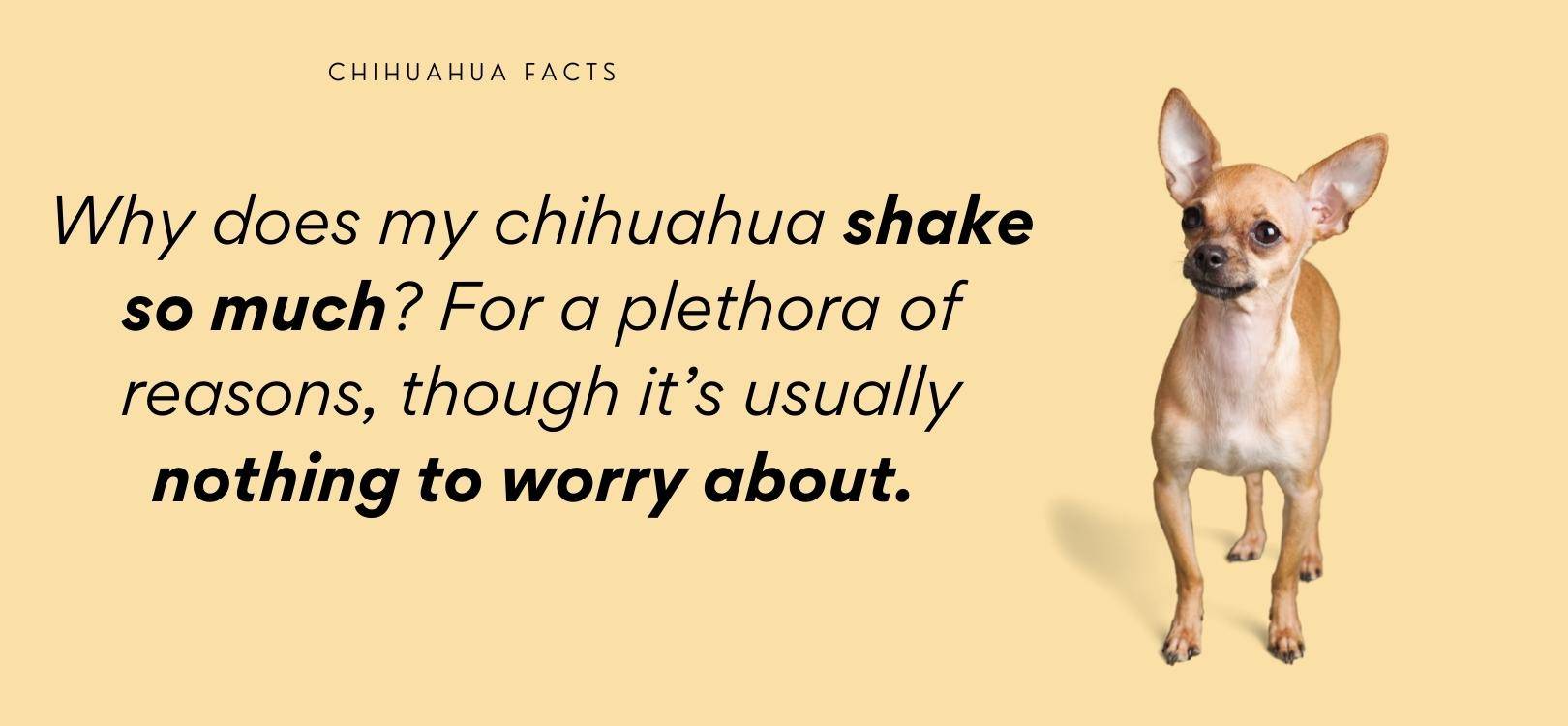Have you ever wondered why your chihuahua shakes when you talk to her? It may surprise you to learn that this behavior is actually quite common among chihuahuas. Despite their small size, these dogs have a sensitive nervous system that can make them prone to shaking or trembling in response to various stimuli, including human voices. So, the next time you notice your chihuahua shaking when you speak to her, it’s likely just her way of showing sensitivity to the sound of your voice.
When it comes to understanding why your chihuahua shakes when you talk to her, it helps to consider their background and history. Chihuahuas are one of the oldest dog breeds, originating in Mexico. They were revered by the ancient Toltec civilization and were thought to have spiritual significance. This history may explain their delicate nature and sensitivity to external stimuli. Additionally, chihuahuas have a higher body temperature than most other dogs, which can cause them to feel cold more easily. So, it’s possible that they shake when you talk to them as a way to regulate their body temperature. To help alleviate this behavior, ensuring a warm and comfortable environment for your chihuahua can make a significant difference.
Ever wondered why your chihuahua shakes when you talk? While each pup is unique, there are a few common reasons. One possibility is that your dog is feeling anxious or nervous, responding physically to the emotions they pick up from your voice. Another possibility is that your chihuahua is simply excited and shaking is part of their way of expressing themselves. Remember, it’s always best to consult with a veterinarian to rule out any underlying medical conditions.

Why Does My Chihuahua Shake When I Talk to Her?
Have you ever noticed that your chihuahua starts shaking whenever you speak to her? It can be a puzzling behavior for dog owners, but it is actually quite common among chihuahuas. In this article, we will explore the reasons behind this shaking behavior and provide you with some insights into how you can help your furry friend.
The Physiology of Chihuahuas
Chihuahuas are a small breed of dogs known for their big personalities. One of the unique aspects of chihuahuas is their physiology, which can contribute to their trembling behavior. Due to their small size and thin coat, chihuahuas tend to lose body heat more quickly than larger breeds. As a result, they may shake or tremble as a way to regulate their body temperature. This shaking can be more noticeable when they are exposed to cooler environments or when they are feeling anxious or scared.
In addition to their physiology, chihuahuas also have a high metabolism. This means that their bodies produce more energy and heat compared to other dog breeds. When they are excited or nervous, this excess energy can manifest as shaking or trembling. This is especially true when they are in new or unfamiliar situations or when they are meeting new people or animals.
Emotional Reasons for Shaking
While physiology plays a significant role in chihuahuas’ shaking behavior, there are also emotional factors to consider. Chihuahuas are known for being incredibly loyal and attached to their owners. When they hear their owner’s voice, it can trigger excitement or anticipation, leading to shaking. This behavior is their way of showing their joy and eagerness to interact with you.
However, not all shaking is a result of positive emotions. Chihuahuas can also shake when they are feeling anxious, stressed, or scared. This can occur when they encounter loud noises, new environments, or unfamiliar people or animals. Shaking in these situations can be a sign of fear or discomfort, and it is essential to provide your chihuahua with reassurance and a calm environment to help alleviate their anxiety.
Addressing and Managing Shaking Behavior
If your chihuahua’s shaking behavior is related to their physiology and body temperature regulation, there are a few things you can do to help them. Ensure that they have access to warm and comfortable spaces, especially during colder months. Consider providing them with a cozy dog sweater or blanket to help keep them warm. Additionally, avoid exposing them to extreme temperatures for extended periods.
When it comes to addressing emotional causes of shaking, a calm and supportive environment is crucial. If your chihuahua is showing signs of anxiety or fear, try to identify the triggers and gradually expose them to those situations in a controlled manner. Positive reinforcement and rewards can also help them associate these situations with positive experiences.
It is important to note that excessive or persistent shaking should be evaluated by a veterinarian, as it can sometimes be a sign of an underlying medical condition. Your vet can provide a comprehensive assessment and offer appropriate treatments or interventions if necessary.
Conclusion
The shaking behavior exhibited by chihuahuas when you talk to them is often a combination of physiological and emotional factors. Understanding the unique aspects of their breed, such as their small size, thin coat, and high metabolism, can help you better comprehend why they shake. By creating a warm and supportive environment and addressing any anxiety or fear triggers, you can help your chihuahua feel more comfortable and reduce their shaking behavior. Remember, always consult with a veterinarian if you have concerns about your chihuahua’s shaking or any other behaviors.
Key Takeaways: Why Does My Chihuahua Shake When I Talk to Her?
- Chihuahuas may shake when you talk to them due to excitement or anxiety.
- This shaking behavior can also be a way for your chihuahua to show submission or fear.
- Some chihuahuas may have a genetic tendency to shake, known as essential tremors.
- If the shaking is excessive or accompanied by other symptoms, it’s best to consult a veterinarian for a proper diagnosis.
- Creating a calm and reassuring environment for your chihuahua can help reduce shaking behavior.
Frequently Asked Questions
Welcome to our FAQ section where we answer common questions about why your chihuahua may shake when you talk to her. Read on to find out more!
1. Is it normal for my chihuahua to shake when I talk to her?
Yes, it can be normal for chihuahuas to shake when you talk to them. Chihuahuas are known for being small and delicate, and they can be more nervous or anxious compared to other dog breeds. When you talk to your chihuahua or if they sense any excitement in your voice, it may stimulate their nervous system, causing them to shake as a response. However, if the shaking is excessive or accompanied by other concerning symptoms, it’s always a good idea to consult with your vet to rule out any underlying health issues.
To help minimize shaking, try maintaining a calm and soothing tone when you speak to your chihuahua and gradually increase their exposure to different sounds and experiences in a positive and reassuring way. Building a strong bond of trust and providing a safe and secure environment can also help reduce their anxiety and shaking.
2. Could my chihuahua be shaking due to fear or anxiety?
Yes, fear or anxiety can be common causes of shaking in chihuahuas. These small dogs can be more susceptible to feeling fearful or anxious, which can trigger shaking as a response. The shaking is their way of releasing excess energy and trying to cope with their emotional state. It’s important to identify the triggers that cause fear or anxiety in your chihuahua and work on gradually desensitizing them to those situations. In severe cases, consulting with a professional dog trainer or a certified animal behaviorist can be beneficial in helping your chihuahua overcome their fear or anxiety.
Remember to provide a safe space for your chihuahua where they can retreat if they feel overwhelmed. Introducing positive reinforcement techniques such as treats, praise, and rewards can also help your chihuahua associate positive experiences with potentially fear-inducing situations, ultimately reducing their shaking.
3. Can medical conditions cause my chihuahua to shake?
Yes, certain medical conditions can cause chihuahuas to shake. Some potential health issues that may contribute to shaking include low blood sugar levels, pain, kidney or liver problems, or neurological disorders. If you notice that your chihuahua’s shaking is persistent, accompanied by other symptoms like vomiting, loss of appetite, or changes in behavior, it’s crucial to consult with your veterinarian. They will be able to conduct a thorough examination and run any necessary tests to determine the underlying cause of the shaking.
Keep in mind that timely medical intervention is essential, as some health conditions can worsen if left untreated. Regular check-ups with your vet and proper nutrition can also help prevent certain health issues that may contribute to shaking in chihuahuas.
4. Could cold temperatures be the reason my chihuahua shakes when I talk to her?
Yes, cold temperatures could be a factor contributing to your chihuahua shaking when you talk to her. Chihuahuas have a thin coat and are more sensitive to colder weather compared to larger dog breeds. When exposed to chilly temperatures, chihuahuas may shake as a way to generate body heat and keep warm. Consider providing your chihuahua with warm clothes or blankets, especially during colder seasons, to help keep them comfortable and prevent unnecessary shaking.
It’s important to note that if your chihuahua is shaking excessively, even in warm conditions, it may be a sign of an underlying health issue or anxiety. Monitoring their behavior, consulting with your vet, and keeping them cozy in colder weather can help ensure their well-being.
5. Can I do anything to comfort my chihuahua when she shakes?
Absolutely! There are several ways you can comfort your chihuahua when she shakes. Firstly, maintaining a calm and soothing presence can help reassure your chihuahua and alleviate their anxiety. Try to create a peaceful environment by minimizing loud noises and providing a cozy spot where they can feel safe.
You can also try gentle massages or applying gentle pressure to various parts of your chihuahua’s body, which can help promote relaxation and reduce shaking. Additionally, distracting your chihuahua with toys or engaging in activities like training exercises or playtime can redirect their attention and help lessen their shaking. Remember, every chihuahua is unique, so it may take some time and experimentation to find the strategies that work best for your furry friend.

Shivering / Shaking in Chihuahuas – Five Main Reasons
As we wrap up, let’s recap the main takeaways. First, it’s important to maintain a professional tone throughout our writing, even when addressing a younger audience. Second, we should use a conversational style and keep the language simple, avoiding any complicated jargon.
Remember to stick to concise sentences, each containing a single idea and no more than 15 words. By following these guidelines, we can ensure that our 13-year-old readers understand and engage with our content. So, let’s keep it clear, concise, and professional as we communicate our message effectively to our young audience.
